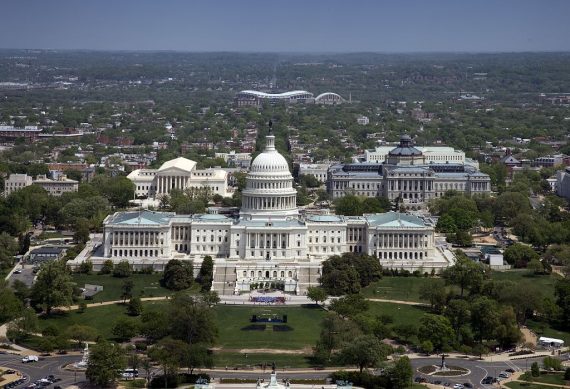Congressman Steny Hoyer Thinks Congress Needs A Pay Raise
House Minority Whip Steny Hoyer suggests that his fellow Congressmen and Senators are underpaid at $174,000 per year.
House Minority Leader Steny Hoyer is advancing what probably qualifies as the most unpopular political idea ever:
Most members of Congress make $174,000 a year. Two senior House Democrats say lawmakers deserve a raise.
Minority Whip Steny Hoyer (D-Md.) told reporters on Tuesday that he’s concerned that congressional members’ salaries, which have remained at the same level since 2009, will dissuade all but the uberwealthy from serving in Congress.
“This will be the seventh year in a row that we have not done a cost-of-living adjustment. … I think it was appropriate at the time of the recession,” Hoyer said. “But to continue that on, we will dictate that the only people who can serve are the rich, and I don’t think that’s what the Founding Fathers had in mind.”
Hoyer also raised the concern at a Democratic Caucus meeting Tuesday morning, saying he planned to speak with Speaker John Boehner about unfreezing cost-of-living increases for members of Congress, according to sources in attendance. Hoyer, whose suburban Washington district includes many federal workers, is also concerned about small or nonexistent cost-of-living increases for many federal employees.
While most members avoid complaining about their $174,000 salary to avoid looking politically aloof, Hoyer is not alone in arguing that lawmakers need cost-of-living raises just like private-sector employees.
Democratic Rep. Alcee Hastings (D-Fla.) also pushed this week for bigger paychecks for members, arguing that their salaries don’t cover the cost of maintaining two homes, one in D.C. and another in the districts they represent.
“Members deserve to be paid, staff deserves to be paid and the cost of living here is causing serious problems for people who are not wealthy to serve in this institution,” the Florida Democrat said at a Rules Committee meeting.
On some level, I suppose that Hoyer has a valid point when he points out the fact that Members of Congress have not received a cost of living increase in five years. This is something that is untrue for most other Federal Government workers, after all, and it is admittedly true that the District of Columbia and surrounding areas can be an expensive place to live, especially when one must also maintain a residence back home in one form or another. The ideal solution to that problem would probably be legislation that allows for automatic cost of living increases in much they same way they are authorized for other government employees. Alternatively, Members of Congress that fall below a certain income level could possibly be provided with some form a housing allowing that offsets the cost of finding someplace to live in the Washington, D.C. area. One complicating factor, of course, is that the 27th Amendment means that any increase that did pass would not take effect until after the next election,
Politically, though, this is pretty much a non-starter. Given Congress’s approval numbers, which are presently higher than the historic lows that they hit just a couple years back but are still pathetically low, no Member of Congress is going to vote for a raise for Members of Congress unless they are serving in a safe district where a challenge is unlikely to succeed or they plan to retire before the next election. If they did, their support for such a measure would quite obviously be used against them in the next election and, notwithstanding the arguments that Hoyer and Hastings make, most voters are unlikely to be sympathetic to the idea that Representatives and Senators making six figure salaries that are more than three times higher than the median income in the United States. Nor should they be. Perhaps if Congress were actually accomplishing anything except serving as a forum for both political parties to score partisan political points, there might be some justification for increasing Congressional salaries. In the current political environment, though, Hoyer’s pleas of poverty are utterly absurd. Whatever the case, though, the idea will not be going anywhere any time soon because there’s simply no chance that anyone on Capitol Hill is going to support this idea before the 2016 elections.






Cheap red-meat politics aside, I am sympathetic. Why should I take a pay cut to serve in Congress? Do we want only the wealthy to serve (those who can afford to maintain two homes, etc. independently)?
Most importantly – How dependent do we want our congress-critters on the largess of corporate money?
I’m embarrased for Hoyer…who has been sucking at the DC teet for 34 years…and at the Maryland teet for 14 years before that.
First…we institute term limits.
Then we link their pay rate to the median income of Americans. That would make them more interested in working people than the 1% to whom they bow down now.
@C. Clavin: (sigh) Term limits unconstitutional. We’ve already gone through this.
While I somewhat agree that workers crying about their six-figure salaries seems gross and absurd, the enormous pay gap between public and private sector salaries does likely contribute to corruption.
Over at Vox, Ezra Klein made an interesting argument that a pay raise to members of Congress and their staff would actually be the most effective solution to combat excessive lobbying.
As long as there exists a huge gap between lobbying salaries and Congressional , as well as huge gap on information (corps can spend far more on info resources ), members of Congress have huge incentives to court lobbyists from the day they enter office.
@Tony W:
Well, Doug is actually fine with this.
@Tony W:
I’m not absolutely sure of the statistics, but I’d guess that $174,000 a year isn’t a pay cut for most of the population.
And renting an apartment in DC shouldn’t cost more than a couple thousand a month.. If its a problem, instead of increasing their pay, they could provide a supplement for it.
The best argument for increasing pay is actually the one about corruption – they’re less likely to be bought if they’re paid well. In Canada that’s mainly solved by providing them with an excellent pension if they’ve served for more than six years.
I think this is totally backwards. DC may be an expensive place to live, but I can pretty much guarantee that someone who is NOT wealthy will be able to scrape by on $175k per year without suffering even while maintaining a place back home. A wealthy person may not be able to live as they have become accustomed on that amount but that is their own choice.
@C. Clavin:
This assumes that they are Congressmen for the pay. I doubt that is true. Linking their pay to anything would not motivate them in any way.
So you have to ask, what does motivate any particular Congressman. Actually, other than pure ego, I don’t have a clue. I’m sure it is pretty individual. Maybe having them be independently wealthy is the best way to go.
I agree with the raise. When we look at important executives in business or the not-for-profit world we see a huge difference. The CEO of a local religion affiliated hospital gets 1.2 million. This leads to Congress being composed of:
1. Angels interested in public service
2. Rich people who want to swing their d*cks to show how important they are
3. Ideologues who want to squeeze the world into a semblance of the Utopia of their dreams
4. Amoral types who know that power will bring money.
When I look that our leaders, I do not see many angels. I propose a million per Congresscritter and five million for the Prez. At less than $200,000 per year, the only way to go to a top D.C. restaurant is when someone else is paying, and there really are no free lunches.
I’d be okay with a massive pay increase, both for reasons stated by Hoyer and others upthread. In exchange, though, I’d want a very long ban (a decade at least) on lobbying and similar activities.
This is true. Public choice theory. What gets politicians off is not money, it’s power and influence (or, if they’re really idealistic, the notion of helping people). I don’t think pay is the issue keeping us away from good governance.
I am incredibly dubious of the idea that a Congressional pay raise will fight corruption. The problem that people focus on is campaign contributions, not personal gifts to Congressmen, which are already illegal. And again, what Congressmen truly love is power. They love seeing special interests come groveling and punish those that don’t. That’s not going to change with a pay rise.
I don’t know about you, but $174,000 a year sounds pretty wealthy to me. It’s 92nd percentile.
I’m not okay with the pay increase. Lobbying doesn’t line their personal pockets in a direct way like pay; it pays for lots of little things like lunches, and provides campaign dollars. A pay increase will not stop the lobbying efforts. These people are disconnected from reality if they feel they can’t live on 174k in DC with a second home somewhere else. Why is it that they should feel entitled to such a high lifestyle? They don’t even work for 6 months out of the year.
@george:
But a huge majority of the population is nowhere near qualified to serve. It’s a false comparison.
Ideally we want the smartest “angels” running the show. We want lawyers who understand downstream effects of legislation, but also small-l liberals who will listen to multiple sides of an argument. Those people are making mid-six figures in high profile jobs today.
If you want Rufus down that dirt road just out of town running our country, then I suppose our current system is great. He’d be happy with a $2K/month flop house and dinner over at Ben’s Chili Bowl every night. I just think we should aim a little higher.
I find myself in agreement with some people I suspect (and know) I infrequently will…
Like @C. Clavin, I would like to see some term limits (albeit with pretty long terms). Constitutional amendments are hard.
I like the “tie congressional pay to median pay” idea, though for the reason @Tony W states, congressional pay would probably need to be an order of magnitude higher than the actual median pay. It is what it is.
I am also open to @James Joyner‘s idea about curtailing lobbying. @Anonne, this is less about lobbyists buying congresscritters’ lunch and more about the revolving door and preventing congresscritters’ themselves the ability to cash in by becoming lobbyists. But to do this, we would have to seriously contemplate a bump in pay.
I’ll also jump back on my hobby horse and point out that if we would just move the capital to Nebraska, we could institute dormitories and hold down their cost of living somewhat!
Except when they aren’t. From February 15, 2013:
Seems to me that what’s sauce for the goose is sauce for the gander. Congressmen are at least as “economically secure” as public servants.
I’ve worked in the non-profit sector. They cannot compete on salary, so they instead compete on relevance, interesting work, quality of life, etc. Is there any evidence at all of highly-qualified potential Congressmen deciding not to run because of the pay? I doubt it.
I work in academia and it’s the same thing. Most could make a lot more money outside (in the physical sciences, frequently a LOT more). They do it because they like it and because it comes with other benefits.
Keep in mind the great longevity of many Congressmen. Most of the effect of raises will not be to attract smarter, more capable, harder working Congressmen. It will be to pay the same implicitly less smart, less capable, less hard working Congressmen more.
Additionally, there’s a lot of Congressional compensation that is backloaded. I’m not sure I see the need to pay Congressmen more.
@James Joyner: Yup. Couple those ideas and you’ve got a solution. (Although I suspect a ban on lobbying would be unconstitutional?)
I don’t think anyone goes into Congress for the stated pay. The salary is not the objective, which is still handsome for six months worth of “work.” There is no other job like it.
Giving these cretins more money will not attract better people. It will not make them less cretinous. The system is tilted toward lobbying and even if you outlawed it they would find another way around it. You can delay the revolving door by law, prohibiting employment for a certain amount of time with people who have donated to your campaign, but with so much dark money around a pay increase is just gravy.
Here’s a radical idea: tie the pay to performance rather than to just winning elections in the same safe districts over and over again. How do you measure Congress’s performance? I’m pretty sure that an approval rating of 19% doesn’t correspond to a Congress that’s performing well.
@Hal_10000: You’ve hit on one of the major problems in our economic system–a person can be at the 92nd percentile and still not in any meaningful way be “rich.” Just a few weeks ago, I was reading an article that was describing the perceived need to expand financial aid eligibility to families with incomes of $250,000. It seems that $250k a year is not enough to allow parents to fully fund their children’s education–not just at Ivies and privates, but also at state schools. Hmmmm……
@Dave Schuler: tying pay to approval rating might be an idea as well, but I’m sure they’ll find a way to game the system somehow.
“What’s in it for me?!” seems to be the logic. May all Randians crash and burn.
@Tony W: While I see your point, considering who we’ve got now, I’m not sure I shouldn’t give “Rufus” as shot.
@Hal_10000:
I was including that as part of the non-profit sector. 🙂
Academia, government labs, quasi-governmental think tanks, the Red Cross, the World Bank, the Federal Reserve, … None of those seem to have a hard time finding and keeping very smart people, despite the less-competitive pay.
Hoyer must be a Democrat — he wants to pay people more for doing nothing.
[rim shot]
Term Limits
Per WikiP 15 States have imposed arbitrary term limits on the members of their legislatures. Maine, California, Colorado, Arkansas, Michigan, Florida, Ohio, South Dakota, Montana, Arizona, Missouri, Oklahoma, Nebraska, Louisana, Nevada.
If anyone can demonstrate that the legislation that passes through these august chambers is somehow wiser and more efficient than acts that are ratified by the other 35 state assemblies, I will consider that term limits might be useful at the federal level.
@ernieyeball: (ahem) you’re going to have a little problem due to the unconstitutionality of that.
Sucks, but that’s how it is.
@James Joyner:
If only. This idea probably won’t ever happen though, simply because it would be too damaging to the current system.
@Tony W:
Actually I’d argue neither is most of Congress, unless the test for ‘qualified’ is solely based on whether you can get elected.
Actually some percentage of Rufuses might end up being better than much of what’s there now. That’s the whole point of having a democracy. If the ones making the decisions come solely from people who think living on $175,000 a year is a burden I’d argue they’re unlikely to understand (or often even care) about the problems affecting the majority of the population.
And its even more complicated than that. There is no shortage of intelligent, successful people (in business or academia or entertainment or you name it) who I wouldn’t trust to park my car, either because they’re dishonest, or because they try to fit the real world into an ideological system much too simple to handle the complexities of reality.
@grumpy realist: I’m not sure that’s true, if passed at the federal level. The court case I am familiar with (U.S. Term Limits, Inc. v. Thornton) specifically addressed term limits for federal office holders at the state level. Is there another case that would would prevent congress and the president from passing such a law?
There’s a strong argument for paying them more. Considering the skill level of the people we should want to attract, the pay just isn’t anywhere near enough. What ends up happening is that Congress members instead seek to parlay their work into much better compensated lobbying or media jobs upon exit, and that isn’t really healthy for our democracy.
@TheoNott:
No, I don’t think there is.
It’s not like there aren’t other compensating benefits. Besides, what would have to go through the head of someone awesomely qualified who would be a Congressman, but for the pay?
“Let’s see, I make a ton of money in my current position, but there’s nothing here I wouldn’t leave in order to do the Congress thing. My family isn’t the reason; my work isn’t the reason; my hobbies and charities and other activities aren’t the reason. Nope; it’s just that I’d have to give up earning even bigger bucks, even though I’m already rich.”
Sorry — that’s not the kind of person I want to entice into Congress.
…but you somehow think that would be less true of people who wouldn’t have run for office at all if it didn’t pay really well? Your logic eludes me. Or, rather, I think you’re mistaking cause for effect.
How about giving them a large pension increase in lieu of a pay increase now, and then just don’t fund it?